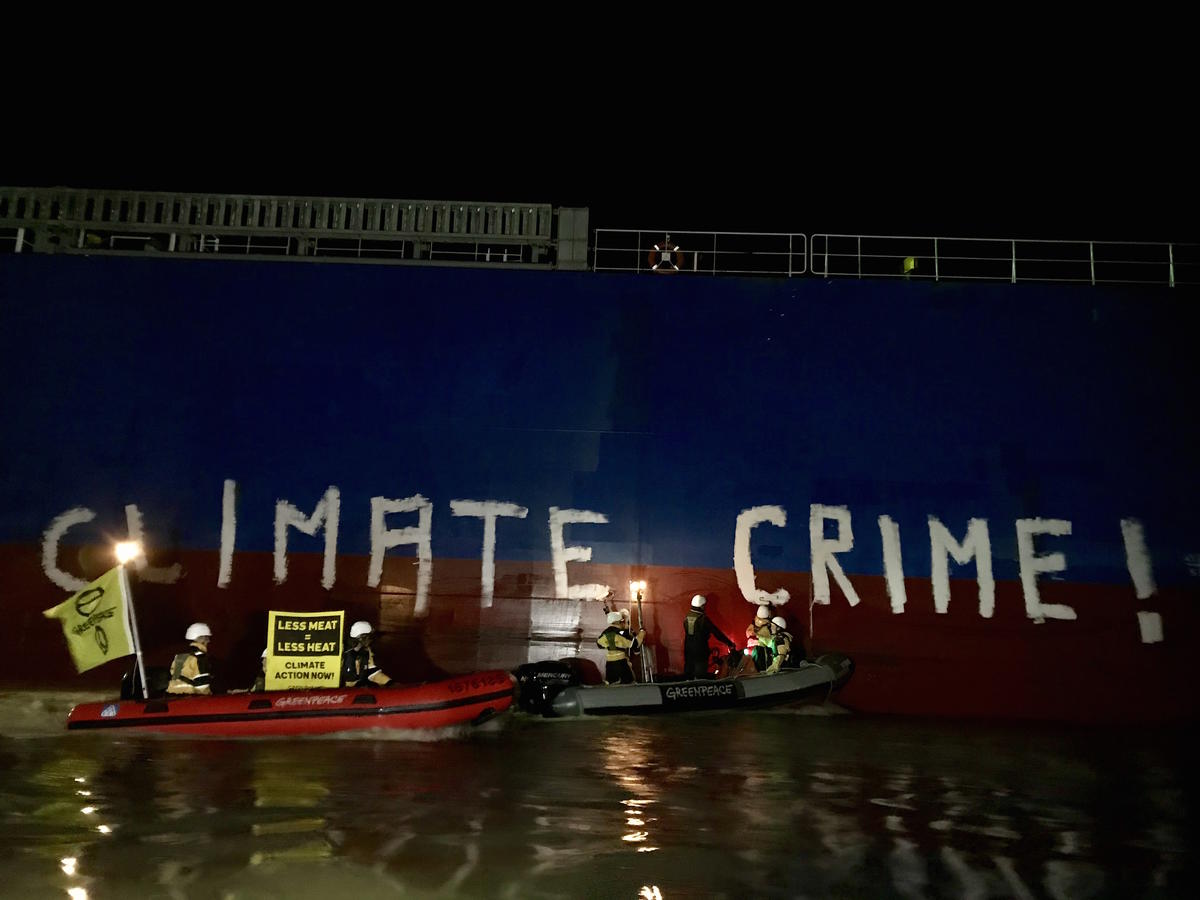Brake, Germany, 4 August 2019 – Activists from Greenpeace Germany are peacefully protesting the import of soya from destroyed forest and savanna regions in Brazil, expected to be carried on the cargo ship “Hiroshima Star” in the Lower Weser river of Germany, today. They have painted “Climate Crime” on the freighter’s hull and are displaying large banners from cranes in the port of Brake. According to the IPCC, land use issues like deforestation and industrial agriculture account for nearly one quarter of human-caused greenhouse gas emissions.[1] The large-scale cultivation of soya, around 90 percent of which is used as animal feed, plays a major role in emissions.[2]
“We need to eat significantly less meat to alleviate the climate crisis. Meat consumption is driving deforestation, monoculture farming for animal feed, and emissions from factory farms,” said Dirk Zimmerman, Sustainable Agriculture Campaigner at Greenpeace Germany.
“European governments must immediately stop the import of soya from forest destruction. At the same time, they must provide incentives for local livestock farmers to adopt species-appropriate farming practices with significantly lower numbers of animals.”

Peaceful activists from Greenpeace Germany protest against the import of soy from destroyed forest and savannah areas on the cargo ship “Hiroshima Star” in the Lower Weser.
The soya is being imported as feed for factory farms, which campaigners say further exacerbates the climate crisis. The protest is being held as the Intergovernmental Panel on Climate Change (IPCC) gathers in Geneva to finalise the Special Report on Climate Change and Land, which will be published on August 8.[3]
Greenpeace is demanding that worldwide meat consumption must be halved by 2050 to limit global warming to 1.5 degrees Celsius. In Europe and North America, it must fall even more drastically by 70 to 90 percent.
According to the recent Greenpeace France report Hooked on Meat, soya production in Brazil has more than quadrupled over the past two decades as global meat consumption has grown. Industrial agriculture is responsible for two-thirds of forest destruction in South America.
ENDS
Photos and Videos can be accessed here
Notes:
According to data from Trase, 85% of the soy exported from the Hiroshima Star’s port of origin comes from the Cerrado region. According to Critical Ecosystem Partnership Fund and Instituto Nacional de Pesquisas Espaciais (INPE), half of the Cerrado’s original vegetation has already been destroyed (about 100m ha), mostly for agriculture, with over a quarter of this loss since 2001. The remaining natural areas hold an estimated carbon store equivalent to 13.7 GtCO2.
[1] Agriculture, Forestry and Other Land Use (AFOLU) made up 24% of annual anthropogenic greenhouse gas (GHG) emissions between 2000 and 2010: https://www.ipcc.ch/site/assets/uploads/2018/02/ipcc_wg3_ar5_full.pdf p8
[2] Sharma S, IATP & Schlesinger S (2017) ‘The rise of big meat: Brazil’s extractive industry’ p25
[3] Around 60 IPCC scientists contributed to the report, which will be available on the IPCC website: https://www.ipcc.ch/report/srccl/.
Contacts:
Matthias Lambrecht, Press Officer, Greenpeace Germany, +49 151-42433135, [email protected] or [email protected]
Greenpeace International Press Desk, +31 (0)20 718 2470 (available 24 hours), [email protected]
Follow @greenpeacepress on twitter for our latest international press releases
